UNHCR study shows rapid deterioration in living conditions of Syrian refugees in Jordan
UN High Commissioner for Refugees António Guterres says large numbers of Syrian refugees are sliding into abject poverty, and at an alarming rate, due to the magnitude of the crisis and insufficient support from the international community.
He made the statement at the launch of a new UNHCR study, Living in the Shadows, which reveals evidence of a deepening humanitarian crisis. High Commissioner Guterres is on a two-day visit to Jordan, where he will meet refugees profiled in the study in Amman and others at the Za’atari refugee camp.
“I am here to express my solidarity with Syrian refugees, as the impact of snowstorm Huda is still tangible and posing an even greater strain on their already dire living conditions.” Guterres is also meeting with Jordanian officials and with donors to coordinate efforts to improve living conditions for Syrian refugees and support the communities hosting them.
Conducted by UNHCR and International Relief and Development (IRD) the study is based on data from home visits with almost 150,000 Syrian refugees living outside of camps in Jordan in 2014.
According to the study, two-thirds of refugees across Jordan are now living below the national poverty line, and one in six Syrian refugee households is in abject poverty, with less than $40 per person per month to make ends meet.
Almost half of the households researchers visited had no heating, a quarter had unreliable electricity, and 20 per cent had no functioning toilet. Rental costs accounted for more than half of household expenditures, and refugee families were increasingly being forced to share accommodations with others to reduce costs.
“Unless the international community increases its support to refugees, families will opt for ever more drastic coping strategies,” Guterres said. “More children will drop out of school to work and more women will be at risk of exploitation, including survival sex.”
As the Syrian conflict approaches its fifth year, many refugees are becoming increasingly dependent on assistance. Jordan’s resources and infrastructure, too, have been stretched to the limit.
In an effort to address this critical situation, UNHCR is providing monthly cash assistance to 21,000 of the most vulnerable Syrian families, or 14 per cent of the Syrian refugee population living outside camps. As of the end of 2014, over 10,000 additional Syrian refugee households have been identified as eligible for such assistance but, due to lack of funds, cannot be provided with support.
Overall, the report’s findings make it clear that any further reductions in the current levels of support will have immediate and serious consequences for Syrian refugees in Jordan. The situation is particularly worrying for the most vulnerable populations, such as female-headed households and elderly refugees.
Guterres emphasized that this crisis can be mitigated if the international community steps up efforts to alleviate the suffering of the refugees. He praised the efforts of the Jordanian authorities, UNHCR and its partners to address the urgent needs of refugees during last week’s heavy snowstorm.
In total, Jordan has a registered Syrian refugee population of 620,000, some 84 per cent of whom live outside camps.
“This represents a dramatic pressure in the economy and the society of the country not to mention the terrible security impact of the Syria crisis in itself,” Guterres said.
“The generosity of the Jordanian people and the Government needs to be matched by massive support from the international community – support for the refugees themselves and for the local populations hosting them, but also structural and budgetary support to the Jordanian Government for education, health, water and sanitation and electricity to enable it to cope with this enormous challenge.”
Additional Information:
– The “Living in the Shadows” report is available on our media page at: http://unhcr.org/jordan2014urbanreport/.
Page 25 of 26
-

Joint press release from UNOCHA, UNHCR and UNDP
12 Jan 2016With Syria’s war heading towards a 6th year and with no end to the conflict in sight, UN humanitarian and development agencies today appealed to member states for US$7.73 billion in vital new funding for 2016 to help 22.5 million people in Syria and across the region. The appeal comprises […]
-
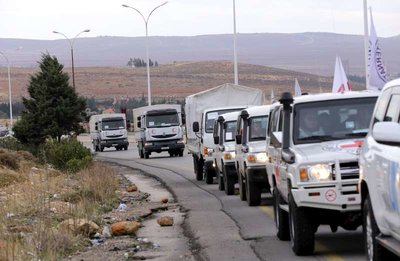
Vital aid reaches starving Syrians in besieged towns
11 Jan 2016MADAYA, Syria, Jan 11 (UNHCR) – The UN Refugee Agency today took part in a convoy of trucks that delivered life-saving aid of food and blankets to thousands of people trapped in dire conditions in besieged Syrian towns on Monday. The first trucks in a convoy of more than 40 vehicles delivered […]
-
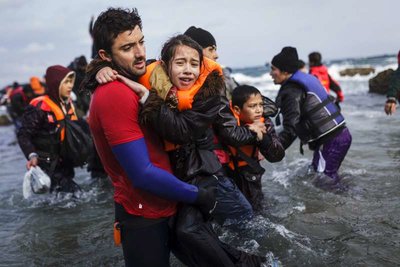
A million refugees and migrants flee to Europe in 2015
22 Dec 2015Persecution, conflict and poverty have forced an unprecedented one million people to flee to Europe in 2015, according to estimates by the UN Refugee Agency, UNHCR and the International Organization for Migration, IOM. As of 21 December, some 972,500 had crossed the Mediterranean Sea, according to UNHCR figures. In addition, […]
-

UNHCR selects the partner organizations for the creation of 20,000 reception places in Greece
18 Dec 2015The UN Refugee Agency concluded yesterday the first phase of the selection of the partner organizations with which it will work jointly for the creation of 20,000 reception places for relocation candidates and other asylum seekers in Greece. Funded by the European Commission, this project envisages the creation of the […]
-
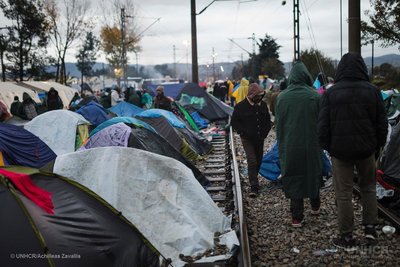
UNHCR recommends measures for strengthening security and refugee protection in parallel
18 Dec 2015UNHCR is today releasing guidance aimed at helping States deal with security concerns while maintaining vital standards of refugee protection. The recommendations are contained in a paper presented at an inter-governmental meeting by Assistant High Commissioner for Protection Volker Türk. The paper argues that national security and international protection for […]
-
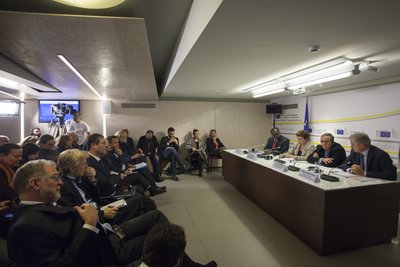
European Commission and UNHCR launch scheme to provide 20,000 reception places for asylum seekers in Greece
14 Dec 2015The European Commission and the UNHCR today launched a scheme to provide 20,000 additional reception places for asylum seekers and relocation candidates in Greece through subsidies for housing in the private sector. The Commission is providing €80 million from the 2016 EU budget. This declaration helps to deliver on a […]
-
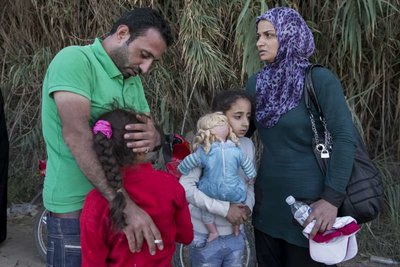
UNHCR says most of Syrians arriving in Greece are students
8 Dec 2015GENEVA, Dec 8, (UNHCR) – The Mediterranean crossing is treacherous, the risk of drowning is constant. But still they come, day after day, in a fleet of dinghies spilling them onto the shores of Greek Islands near Turkey, almost 800,000 so far in 2015 alone. Most are fleeing the conflict in Syria. […]
-

UNHCR concerned by violence at Greek border, calls for improved security
3 Dec 2015UNHCR is deeply concerned about the tension and violence at the border between Greece and the former Yugoslav Republic of Macedonia and calls on the authorities of both countries to manage the border in a manner consistent with human rights and refugee-protection principles. As a result of restrictions by the […]
-

Joint Statement on Protection in the Mediterranean in light of the EU Council’s Decision of 23 April 2015
27 Apr 2015Given the intensification of boat movements and continued unbearable loss of life in the Mediterranean Sea, we, the undersigned*, take note of the Special European Council’s decision of 23 April 2015. We acknowledge the Council’s specific undertaking to “mobilize all efforts at its disposal to prevent further loss of life […]
-

Joint statement on Mediterranean crossings
23 Apr 2015A tragedy of epic proportions is unfolding in the Mediterranean. We, the undersigned*, strongly urge European leaders to put human life, rights, and dignity first today when agreeing upon a common response to the humanitarian crisis in the Mediterranean. The European Union is founded on the fundamental principles of humanity, […]
